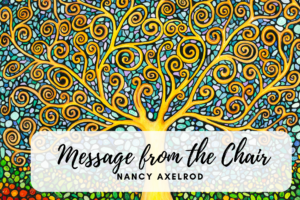 As I write these words at the last minute before the newsletter deadline (I admit that I’ve been rather distracted by obsessing over election coverage), I am struck by how much I have called on Mussar over the past week. I continue to remind myself to look for the Tov at a time when it is tempting to lose faith in our fractious country that seems to be splitting apart at our racial seams.
As I write these words at the last minute before the newsletter deadline (I admit that I’ve been rather distracted by obsessing over election coverage), I am struck by how much I have called on Mussar over the past week. I continue to remind myself to look for the Tov at a time when it is tempting to lose faith in our fractious country that seems to be splitting apart at our racial seams.
As Madrichah and CCM Board Member Adie Goldberg highlights in her words below, CCM helps us not just bring Mussar into our personal relationships, but also into the world. Zikkui haHabbim (many of you may have heard it referred to as Mazkeh leRabbim) – taking Mussar out into the world — has always been a key focus of Rabbi Stone’s teachings, and motivated me to develop a class on Mussar and Antiracism that I began offering this semester.
Seven students and I have spent our first two classes exploring antiracism through a Mussar lens, juxtaposing Mussar texts and concepts with contemporary texts on race. For example, in our first class, took a deep dive into the issue of Otherness, which at CCM has been informed by the teachings of French philosopher Emmanuel Levinas. Levinas warns us not to project ourselves onto the other, equating it with annihilating the other (as quoted by Terry Veling in For You Alone):
“Don’t kill me; don’t absorb me into your world; don’t assimilate me by making me the same as you. I am other, I am different. I am not you.”
Likewise, john a. powell, in his scholarly work, Racing to Justice: Transforming our Conceptions of Self and Other to Build an Inclusive Society, warns us against setting whiteness as the barometer by which all people are measured:
Racing [assigning racial categories] is largely a top-down
process in which the more powerful group first denudes the
racial other of self-definition. This is often accomplished by
denying the other its language and culture, then assigning a
set of characteristics that are beneath those of the more
powerful group. The dominant group thus becomes the invisible
standard by which all others are (unfavorably) measured.
While we may not engage in this annihilation of the other with any conscious intention, Mussar teaches us that our responses to the other are often habitual and rooted in fear. In the case of racial fears, these are built up over a lifetime of conditioning through our education (or mis-education), media and societal norms. How can our Mussar practice help us to not only Kibbush these habitual responses but transform them into a quest for Emet/Truth, Anavah/Humility and Zerizut/Zeal to be a conduit for healing in our country?
As we progress through the semester, I will keep you updated on our explorations. Feel free to reach out to me at [email protected] if you’d like to share your thoughts.
